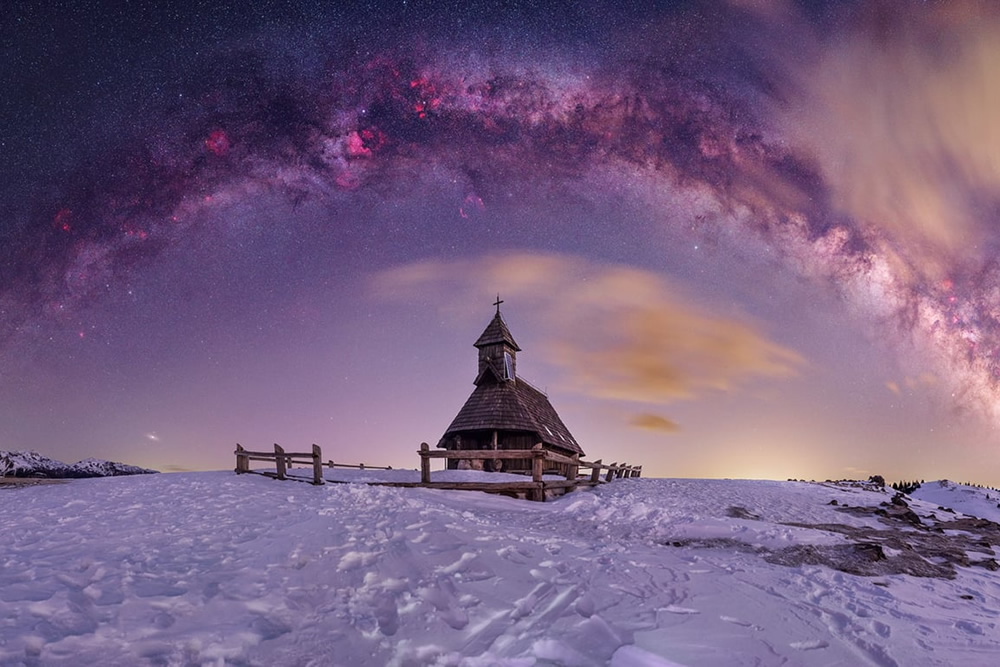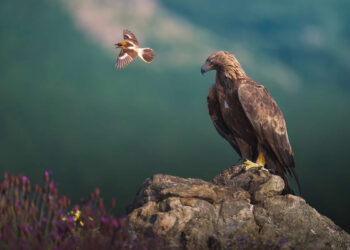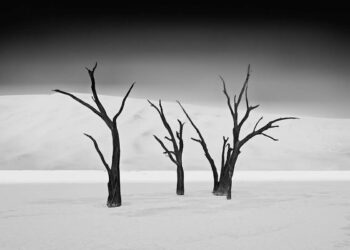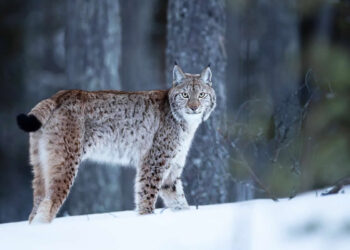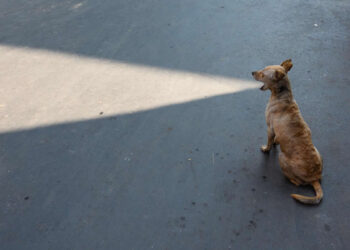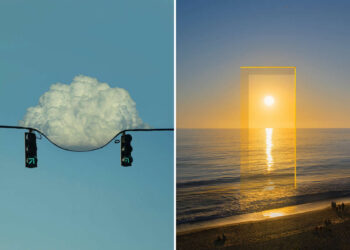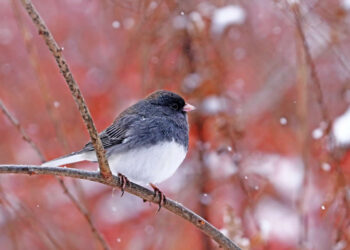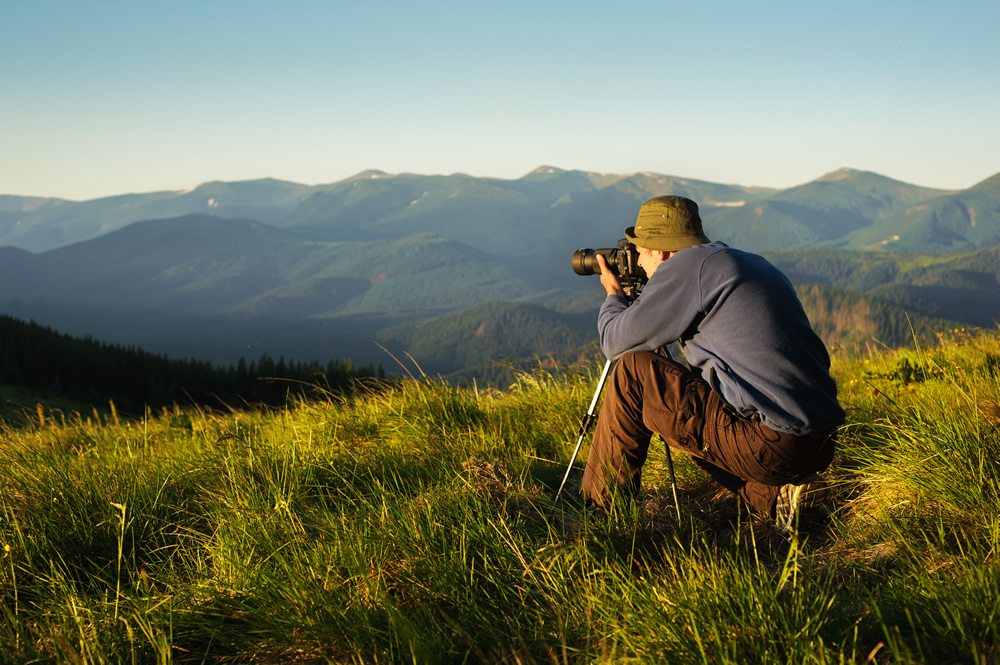Here are the 25 amazing photos of the winners of the 2021 Milky Way photographer of the year.
Photographing the Milky Way is an otherworldly experience. There aren’t many events as moving as seeing our galaxy rising and illuminating the night sky. However, at night, many things are invisible to the naked eye. When you use a camera to capture the Milky Way, a whole new world of details, colors, and light opens up.
Beyond the technical aspects, every Milky Way photograph has a story and a seed that has been growing in the photographer’s mind for some time until all the elements align to create the image.
Please check their website, to view the entire gallery.
You can find more info about Capture The Atlas on the web:
#1 Chamber of light by Spencer Welling
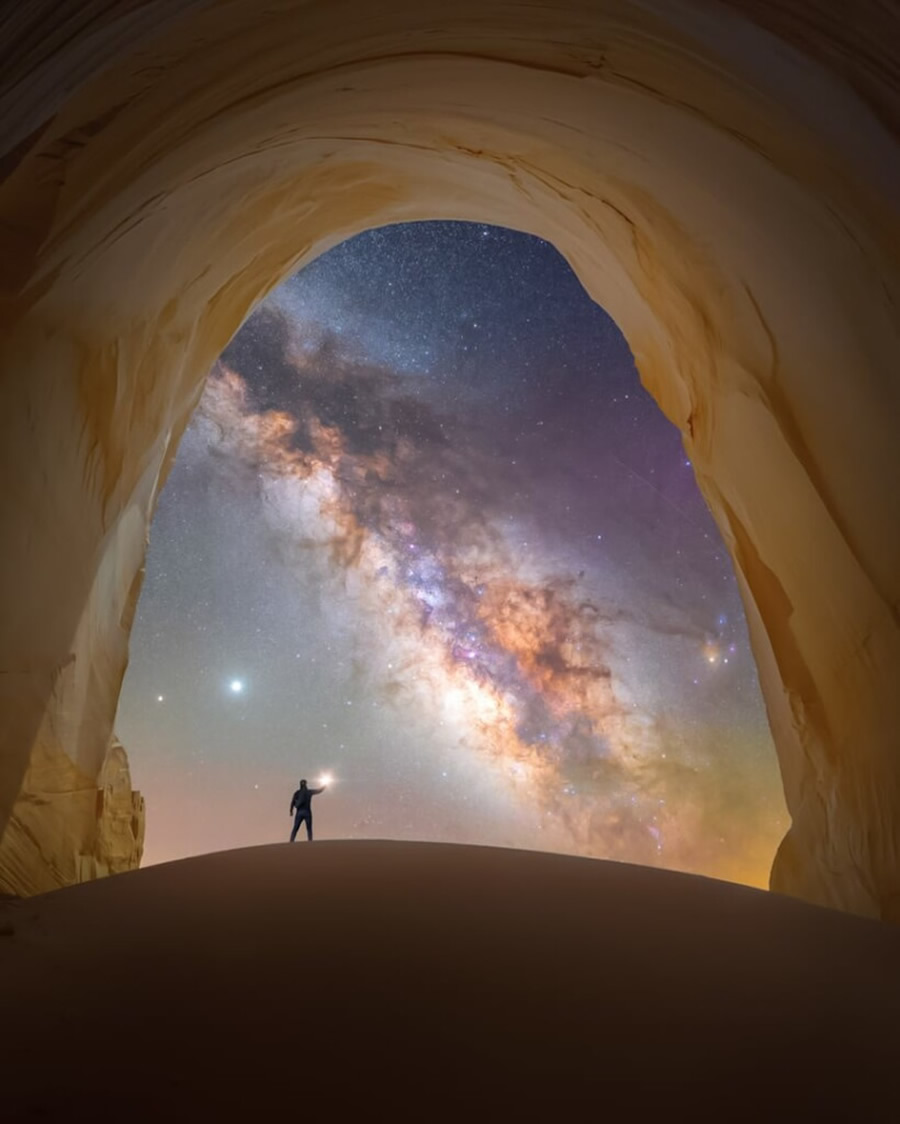
Utah, USA
The deserts of the Southwest are abound with places to capture the night sky. With all that the Southwest has to offer, it’s easy to overlook some of the more obscure hidden gems hovering under the radar.
This is one such location, which is situated below a remote set of cliffs in Grand Staircase-Escalante. Due to its remoteness, this natural stone chamber provides some of the clearest, most pristine views of the Milky Way framed by the copper-colored opening of the cavern.
#2 Dragon’s Lair by Daniel Thomas Gum
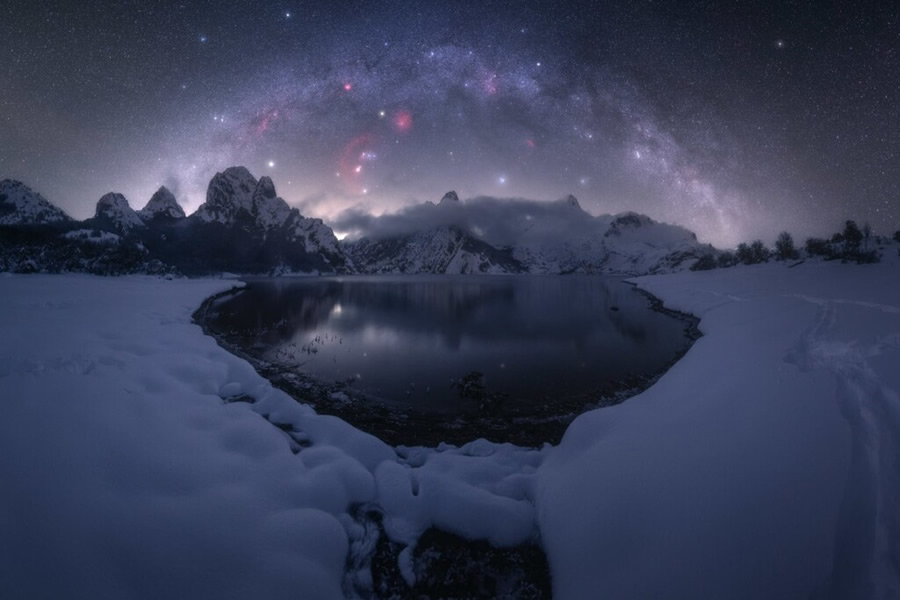
Mungo, NSW – Australia
This is my favourite nightscape image to date. Mungo is a 12-hour drive away from my home in Sydney, but those Bortle 1 skies are the best I’ve ever witnessed and photographed at night. I had perfect conditions for three straight nights, with really good seeing throughout.
The moment I came upon this scene, I knew exactly what I wanted to the name the image. It was otherworldly – think Game of Thrones – and it lined up perfectly for how I wanted to capture it. Large, jagged walls framed a winding path leading to a centered spire to the west. There was only ever going to be one way to do it justice and that was as a multi- layered Milky Way panorama.
I planned this image using PhotoPills during the day, but in post-processing, I decided to use the blue-hour blend for the foreground with a tracked sky for the cleanest possible image.
#3 Riaño by Pablo Ruiz
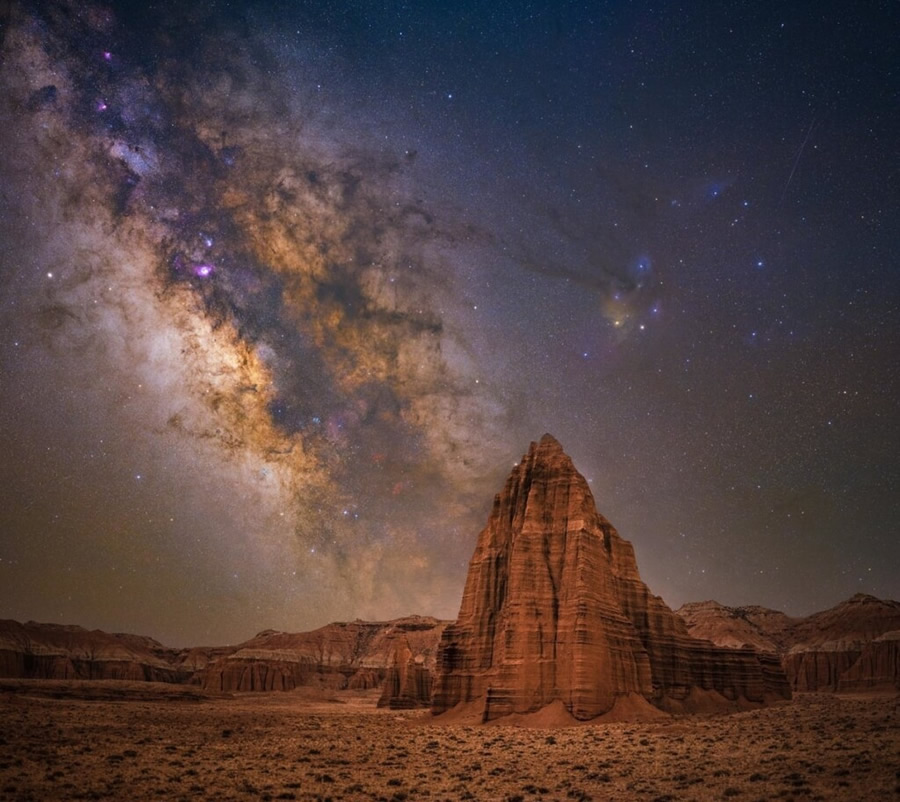
Riaño, Spain
I captured this image last winter in the Riaño Mountain Reservoir in Spain. The biggest difficulty that night was mainly the cold; it was over -10 degrees. The moisture in the reservoir was freezing the lens and it was difficult to shoot for a long period of time.
I planned the photograph using PhotoPills and, when the weather forecast was promising, I decided to try for it. The composition of the winter Milky Way over the mountains and the reservoir created magical scenery.
#4 Temple of the sun by Bryony Richards
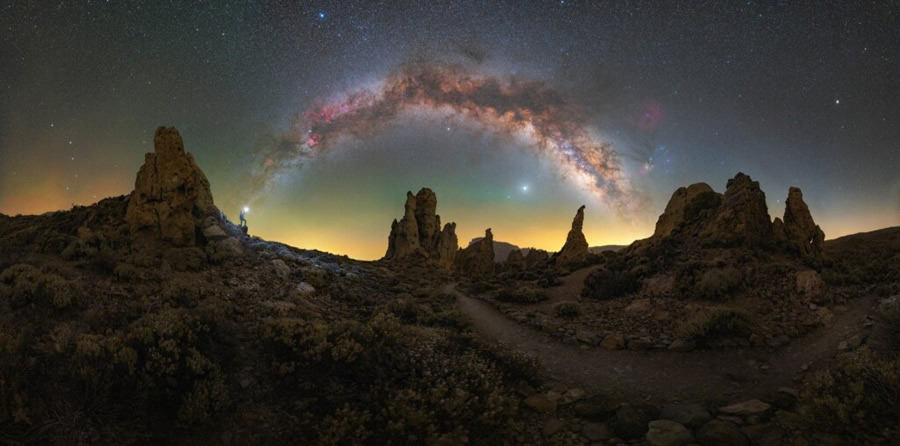
Capitol Reef National Park, Utah – USA
The Milky Way core rises before dawn under the southern skies of Capitol Reef National Park’s “Temple of the Sun.” This area of the Colorado Plateau Desert, known for its domes, hoodoos, fins, reefs, natural bridges, and slot canyons, includes the Temples of the Sun and Moon.
These Jurassic-aged sandstone monoliths, which formed as sandy mud on a tidal flat, tower above the otherwise flat desert floor. It seems like more than a coincidence that the Temples line-up perfectly with the Milky Way, their vibrant orange colors seemingly reflecting the color of the stars above.
#5 Rising from the dust by Lorenzo Ranieri Tenti

Tenerife, Canary Islands – Spain
This photograph was taken in Teide Volcano National Park on the island of Tenerife and shows our beautiful Galaxy over an incredible volcanic landscape – a real night-photographer’s wonderland!
From my adventure in Tenerife, this image is the one that best represents my experience, both the ‘good’ and the ‘bad’ side. As you can see in the photo, the landscape is shaped by incredible volcanic structures that rise toward the sky as huge towers that perfectly frame the mighty Milky Way. Then, our home Galaxy, the Milky Way, seems to rise from a thick blanket of dust that scatters all the light from the faraway towns, creating a warm glow over the horizon.
This glow is caused by the “Calima,” a warm wind that comes from Africa, especially from the region of the Sahara Desert. This warm wind is always loaded with the sand of the desert and it has a big impact on night sky visibility, obscuring the sky and the beautiful Milky Way.
In the end, all the good and bad things came together perfectly in this image, giving me the chance to show you this incredible panorama and to come back home with a beautiful memory.
#6 When all the stars align by Kelly Teich
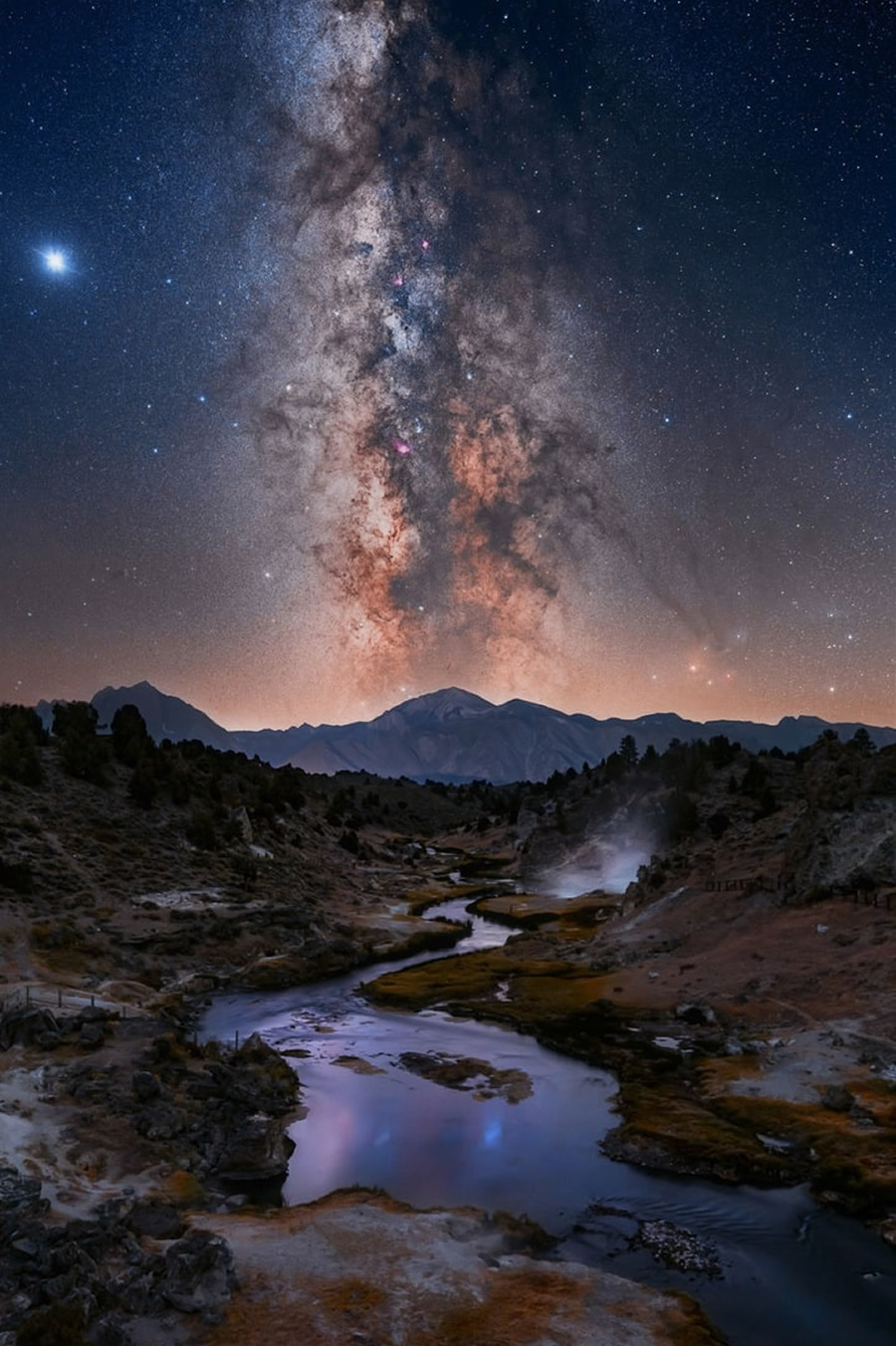
Mammoth Lakes, California – USA
Some of the darkest skies in California are along Hwy 395 on the eastern side of the Sierras. This particular location, near Mammoth Lakes, is a unique spot where the vertical alignment of the Milky Way’s Galactic Core sits perfectly over a mountain peak and a creek with natural hot springs flowing into it.
You really couldn’t ask for a better foreground to work with! This image was taken in July, so I had to wait until a little past midnight for the proper alignment to begin shooting. Rather than going fully wide angle at 16mm, I zoomed in a little to 24mm, so the Milky Way took up more of the frame and I could capture only the most interesting area of the foreground. The sky was shot first using a star tracker. Then, I turned off the tracker and shot the foreground using the same camera settings. A simple post-processing blend of the two (sky and foreground) completed the image.
#7 GranTeCan by Antonio Solano
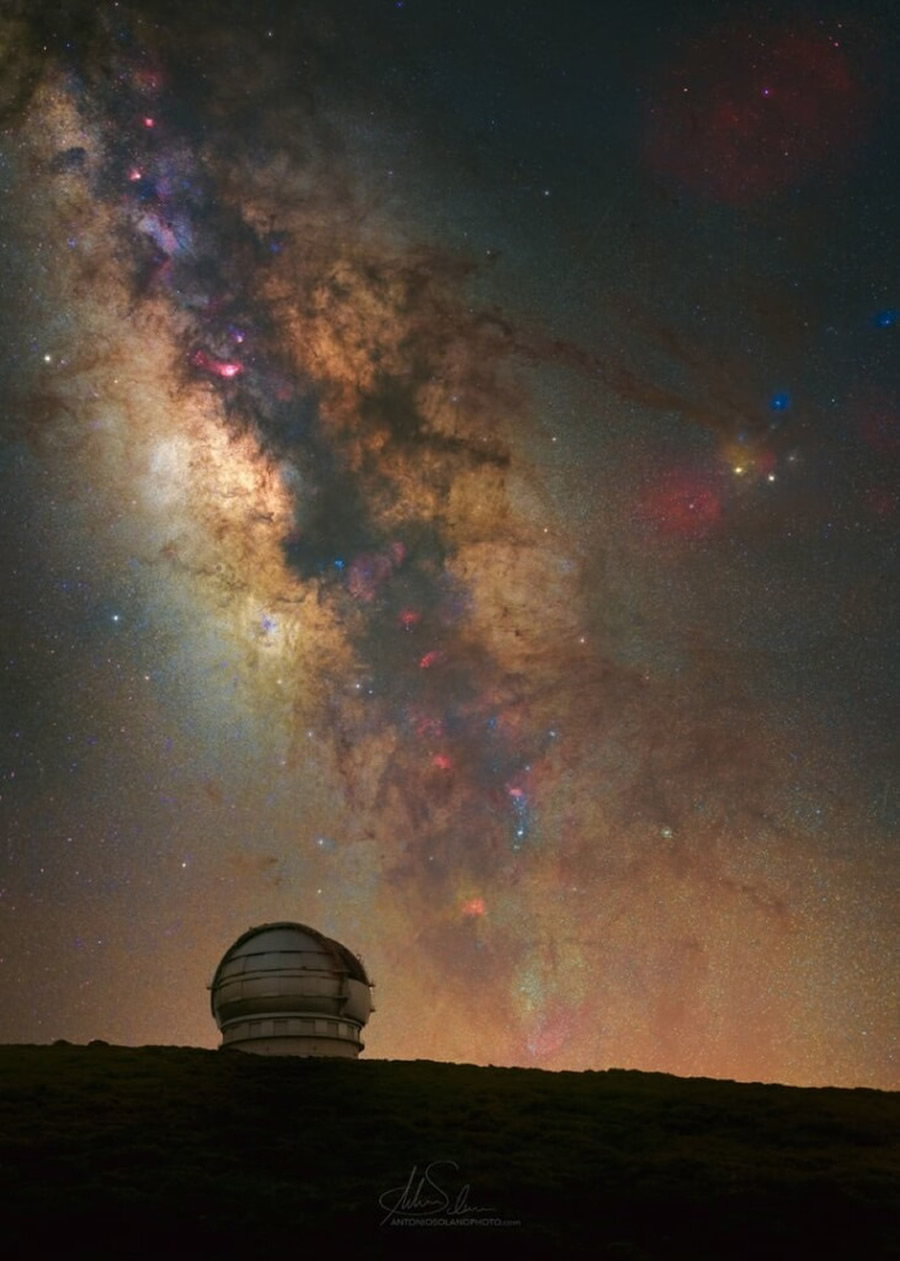
La Palma, Canary Islands – Spain
On the last night of my trip to La Palma, I went up to the “Roque de los Muchachos,” where I enjoyed a nice dinner with my girlfriend while watching the spectacular sunset over the sea of clouds that is typical of this location.
Moments later, the first stars were already visible and I set up my camera gear. The night was fantastic; there was no wind and no “calima” (haze) on the horizon. After several tests, I opted for a 50mm focal length that allowed me to capture a closer perspective of the telescope while framing our Galactic Bulge.
#8 Mt. Taranaki Milky Way by Larryn Rae
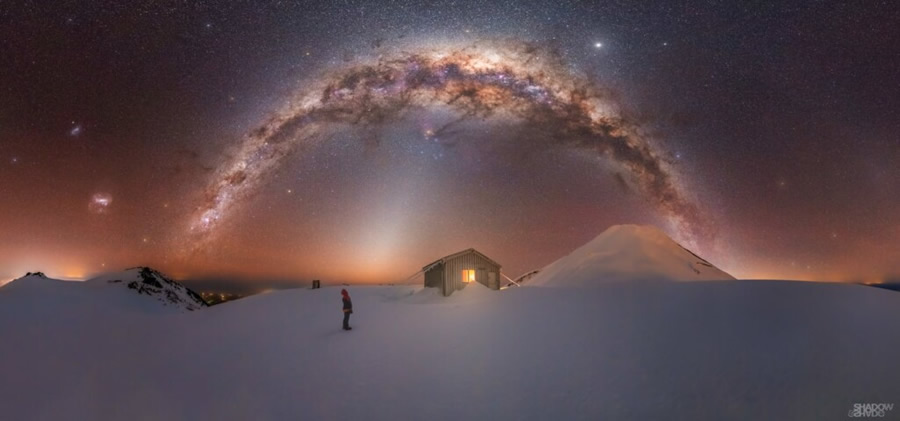
Fanthams Peak, Mt. Taranaki – New Zealand
This is one of the most challenging shots I have ever captured, as it required climbing for 4 hours in 70km/h winds to reach the ice summit of Fanthams Peak – a volcano on the side of Mt Taranaki. At an elevation of 2000 m and -15ºC outside with gusty wind blasts, I had to choose settings that would get me the capture rather than what I may have considered more ideal settings.
I am so stoked to have captured what I did under perfect clear skies, as it was both a true test of both mountaineering and endurance carrying all my gear to this location, but one I will look back on with pride ands success.
#9 The watchman by Brandt Ryder
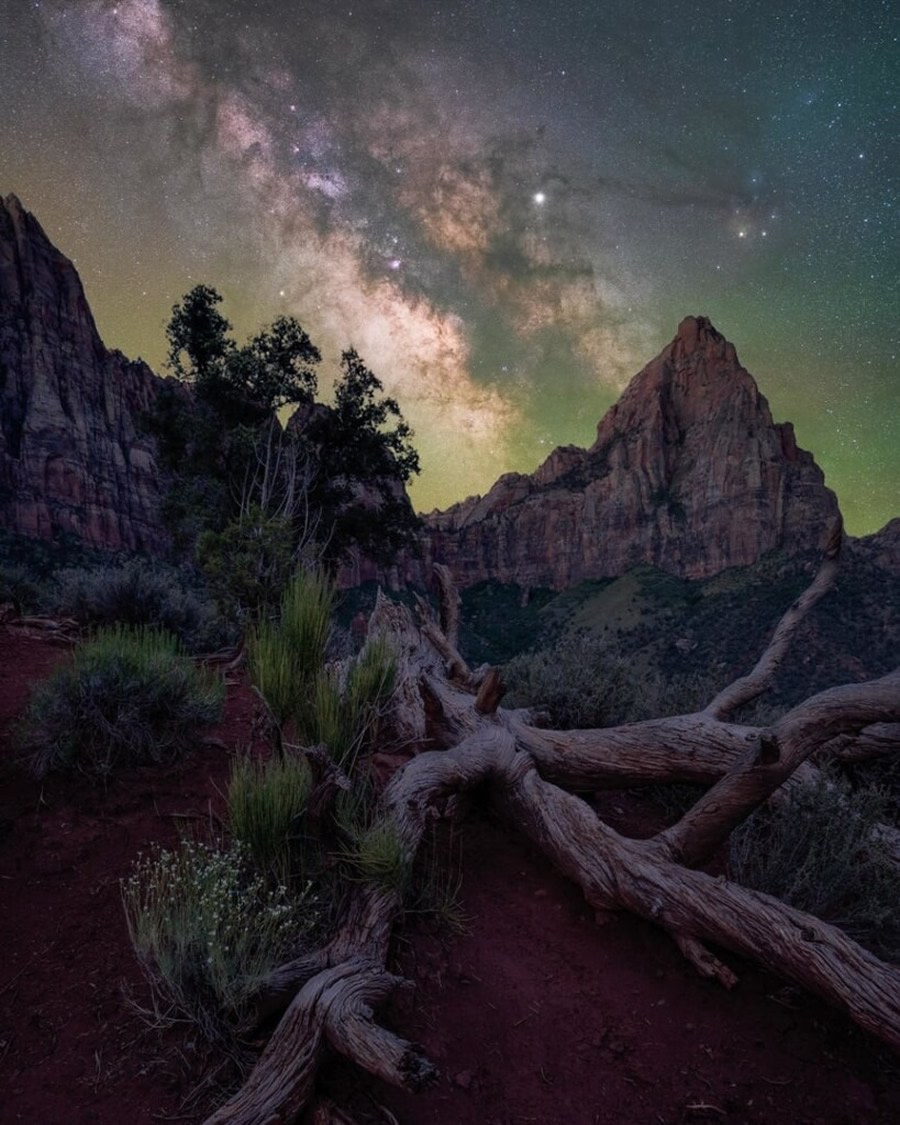
Zion National Park, Utah – USA
Utah’s dark skies are a mecca for astrophotographers from around the world. Zion National Park is one of the premier locations and, for as long as I can remember, nightscapes from this park have captured my imagination. When I finally traveled to Zion, I knew I wanted to capture something unique, something different from the traditional shot, but one that still featured the iconic and austere “Watchman.”
I had seen some photos from a closer angle and after some exploring, I came across this twisted skeleton of an old juniper framing “The Watchman.” As a photographer, I am always looking for interesting foreground subjects. Foregrounds that have features that can in some way recapitulate or accentuate the background are rare but always the most compelling. When I noticed how the angles of the tree matched the peak near perfectly, I knew I had found something special. This composition is a blue-hour blend with the sky taken at night and the foreground taken before the sun came above the horizon.
#10 Around dead trees by Gary Bhaztara
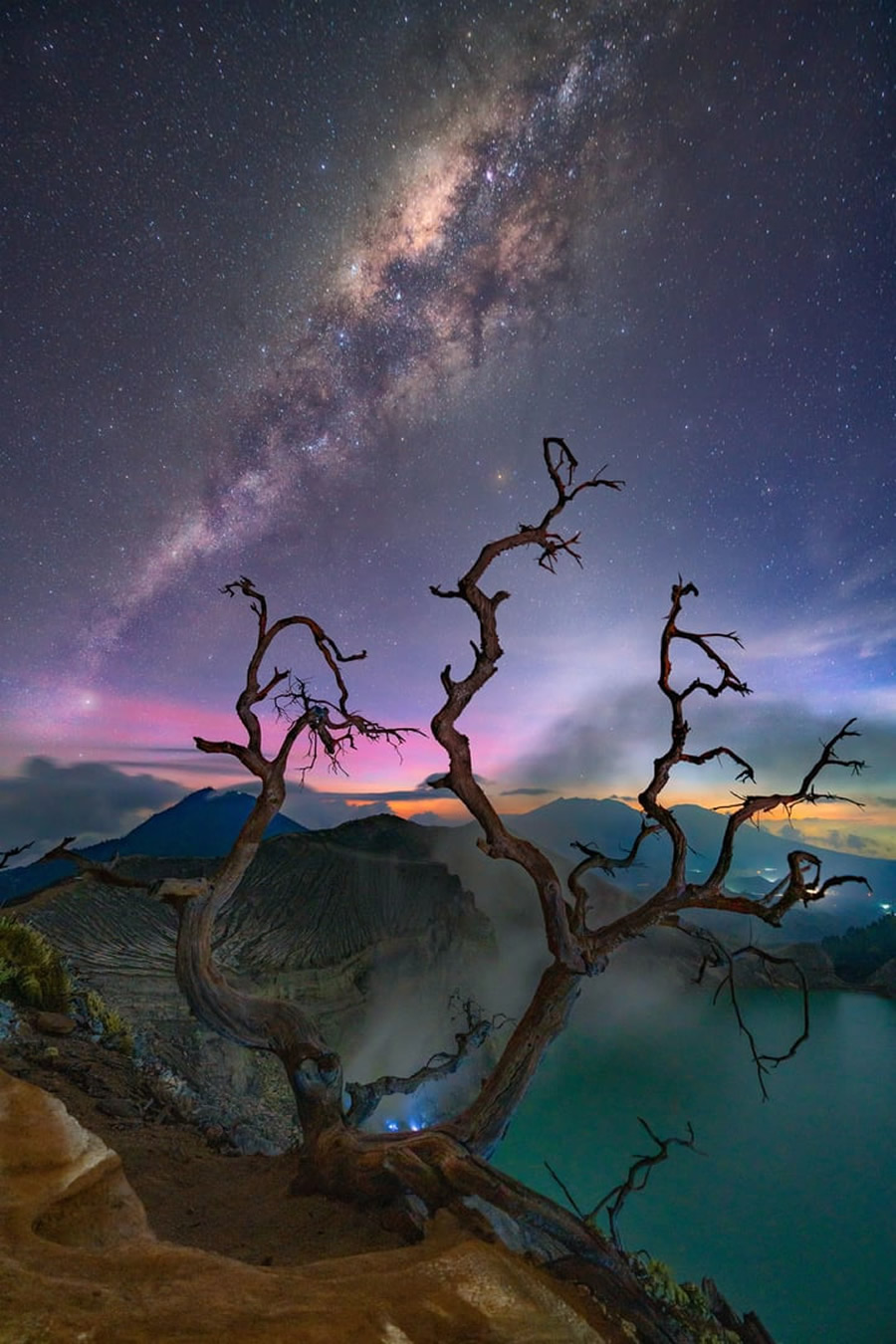
Java, Indonesia
I took this shot of the Milky Way facing south after the sun set in the west. At the same time, the blue fire was burning just below the mountain while the Milky Way kept rising.
Taking the picture at this spot was a bit difficult because of healthy reasons and the National Parks schedule. It’s prohibited to stay there after midnight, so I didn’t have much time to take more images. This trip was a struggle because of the many challenges but I love every single corner of the Ijen Crater; it’s like a piece of heaven on earth.
#11 Heavens above by John Rutter
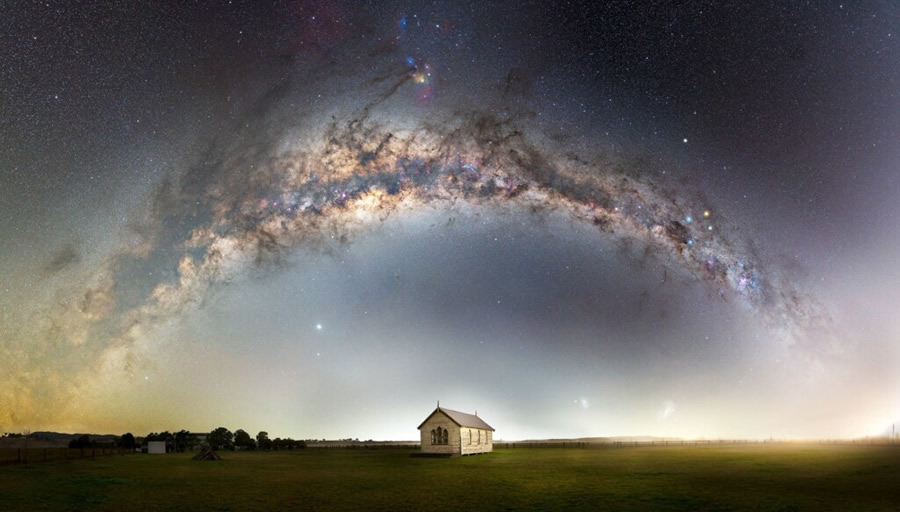
Hunter Valley, NSW – Australia
This old church sits peacefully in a paddock in the Hunter Valley of NSW, Australia.
That night, the forecast was for terrible weather, so I had written the night off and went home. To my amazement, the skies cleared and it was a race to get back to the location and start shooting. As the fog started rolling in towards the end of the capture, a perfectly timed car drove past to illuminate the scene and the fog.
My passion is bringing the full Milky Way arch into people’s homes via large panoramas. I would encourage everyone to head out to a dark sky and experience it. Camera or not, it is a truly amazing sight to stand under the full arch of the Milky Way.
#12 Volcano and cross by Tomas Slovinsky
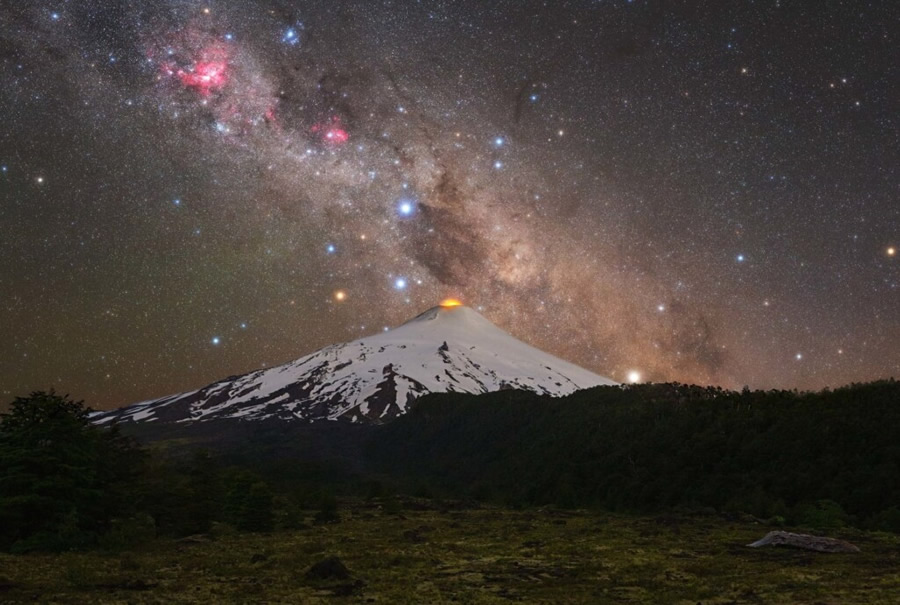
Villarrica Volcano, Chile
If you’ve never seen the Southern Sky, it’s significantly different and truly amazing. In the Northern Hemisphere, we use Polaris as the polar star, but below the equator, there are other rules. To easily recognize the south celestial pole, the best indicator is the Southern Cross constellation, located in the image just above the Villarrica volcano.
This cross points to the south celestial pole and it’s easy to identify, considering the brightness of the stars. Within the cross, we can see the dark area called “the Coalsack,” which is also visible to the naked eye. It’s one of the best-known dark nebulae in the sky.
In the upper left corner, there’s another night sky gem: the red-colored Carina Nebula. This is also only visible in the Southern Hemisphere and, even though it’s visible to the naked eye, with a pair of binoculars, we can see all the beautiful details.
#13 Night lovers by Mohammad Hayati
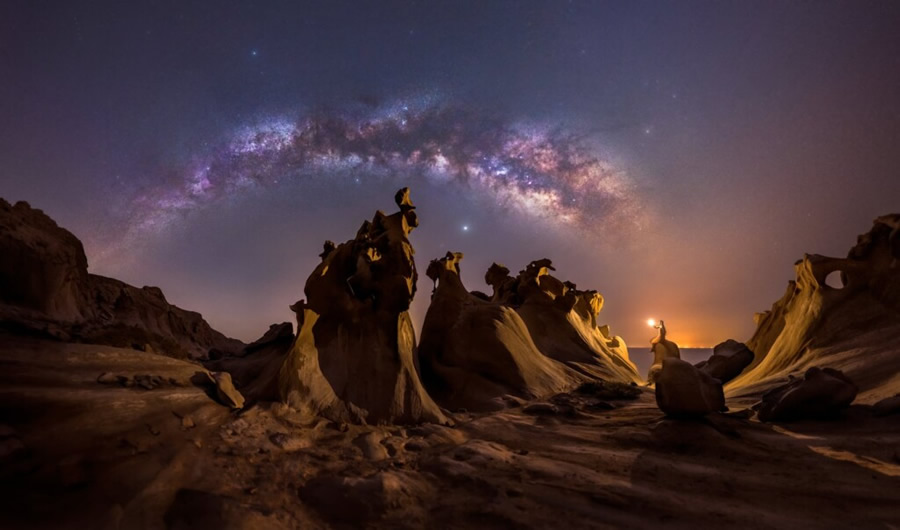
Hormozgan Province, Persian Gulf – Iran
In this picture, you can see the Milky Way rising on a fascinating spring night on the Persian Gulf coast.
The stunning cliffs of this area make every viewer imagine and even talk to them! The light pollution from a faraway city was quite strong, so it was a challenging post-processing process. I’m a nightscaper who tries to achieve an artistic look in my images, and in this image, I tried to convey and capture the magic of this location.
#14 Paradise by Marcin Zajac
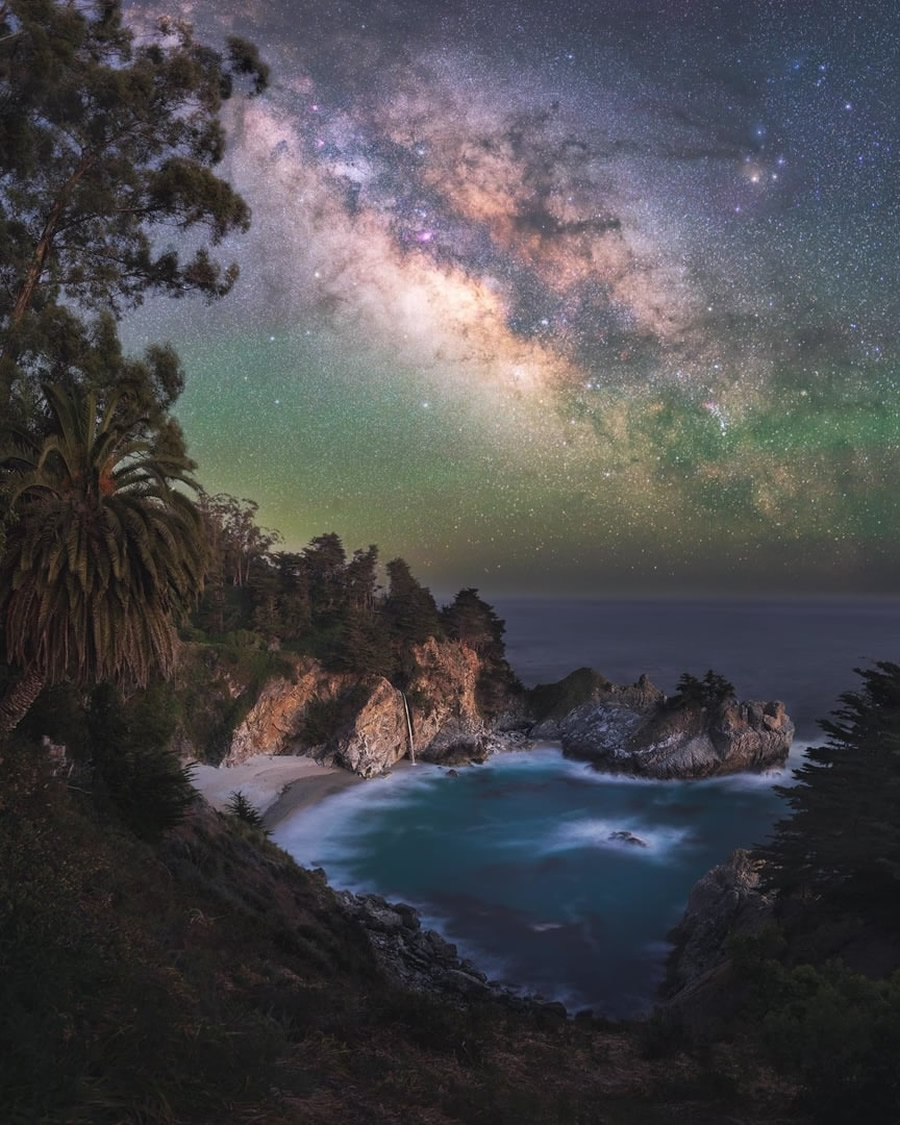
Big Sur, California
If I had to choose my favorite place on earth, this might be it. Located on the Pacific Coast near Big Sur, it really has everything: a beautiful cove filled with emerald waters, an 80-foot waterfall that falls directly onto the beach, a palm tree that makes you feel like you’re on a tropical island, and a perfectly dark sky that shines bright with stars at night.
#15 Desolation by Phil Sisto
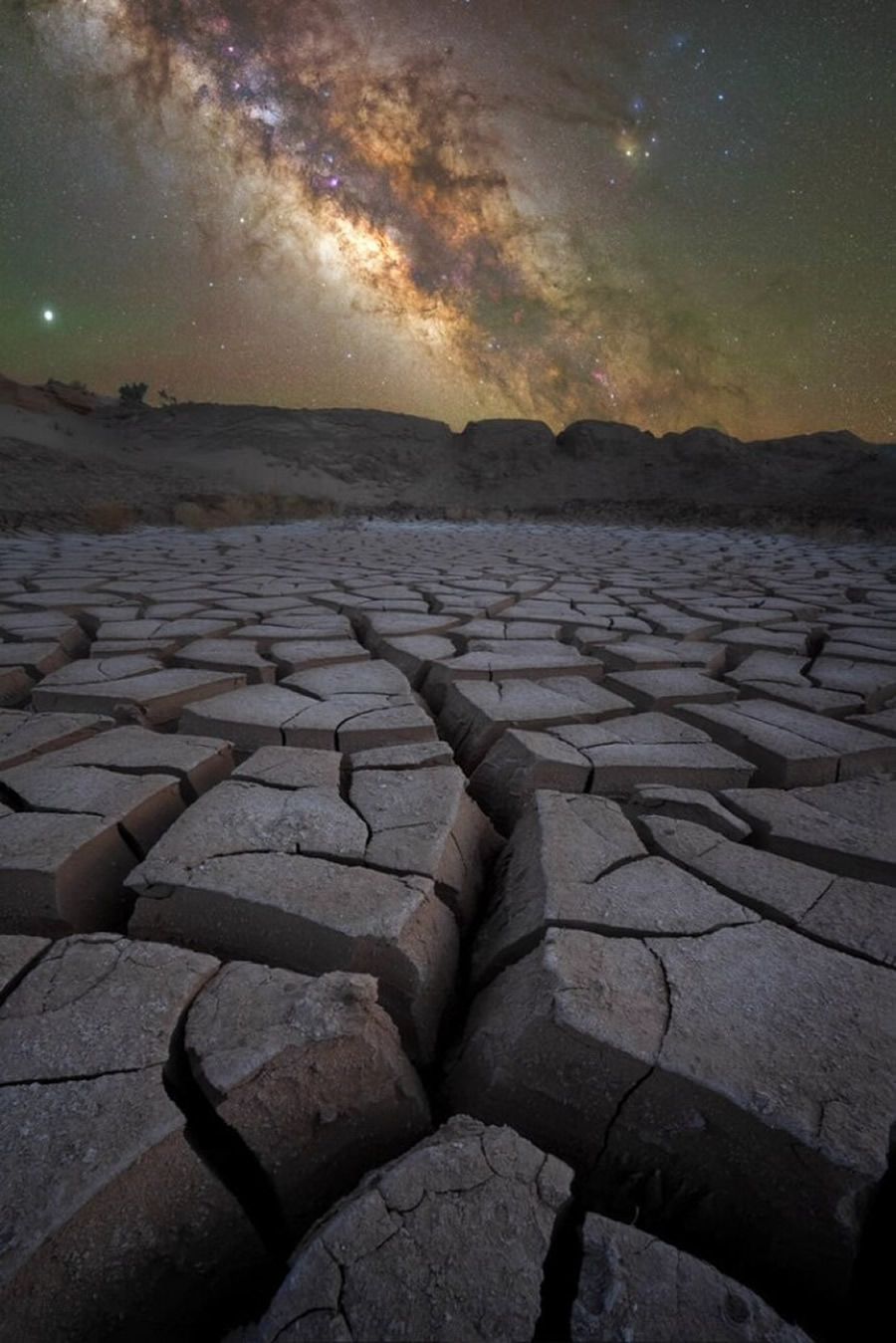
Capitol Reef National Park, Utah – USA
Utah is a place that captured my heart from the beginning of my journey as a Milky Way photographer. Living in the light-polluted Midwest (I’m located in northeast Ohio), it takes three to four hours of driving from my home to arrive at any place where you can get an even satisfactory look at the stars. Because of this, I make my way out West every summer now, seeking out the darkest skies and most epic locations I can find to do photography.
When I learned that Capitol Reef — arguably the darkest national park in Utah! — offered a residency program for its selected artist where I could live and work under those incredible skies for an entire month, I put together a portfolio of the best work I had and an ambitious program proposal…and got accepted! This image was captured in the remote Cathedral Valley District of the park. I placed my camera low to the ground, exaggerating the otherworldly mud cracks with my wide-angle lens, and shot the sky with a longer lens as a panorama on my star tracker.
#16 Paradise Beach by Alyn Wallace
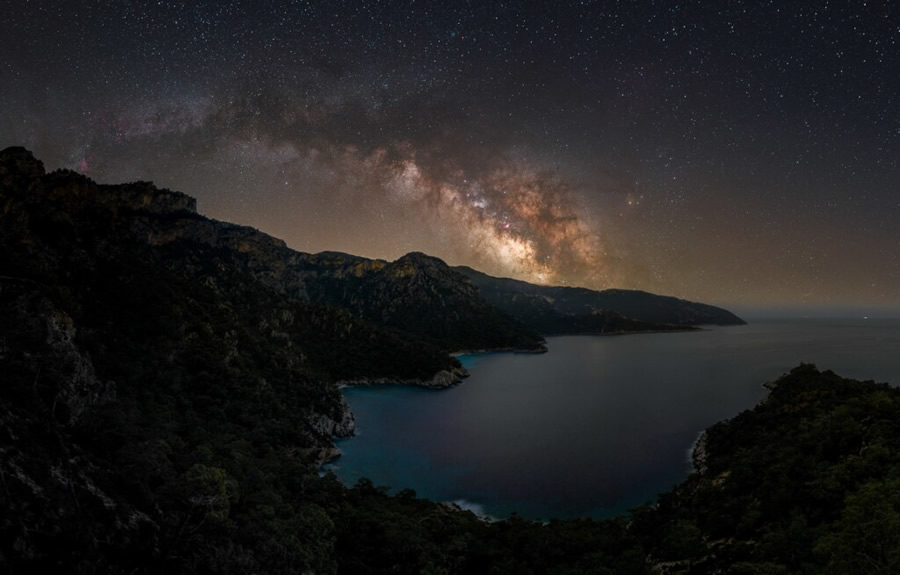
Lycian Way, Turkey
I spent the pandemic in a remote valley on the southwest coast of Turkey trying to avoid the chaos of restrictions and lockdowns and be surrounded by beautiful nature instead. Sadly, the valley I was residing in has very steep walls and only a clear view west, but, as the Milky Way core rises in the southeast at this time of year, I had to hike up over the mountains to get a good view.
The path to get to this location is part of the Lycian Way, a popular multi-day hiking trail along the incredibly beautiful coastline of Turkey. The view overlooks a beach known as “Cennet,” which, translated from Turkish, means “Paradise,” a name I completely agree with!
Sitting on the mountainside enjoying this view of the Milky Way arching across the mountains whilst listening to the sound of the waves breaking gently below and the owls twitting through the valleys was just the kind of peace and solitude I needed.
#17 Devil’s throat by Victor Lima
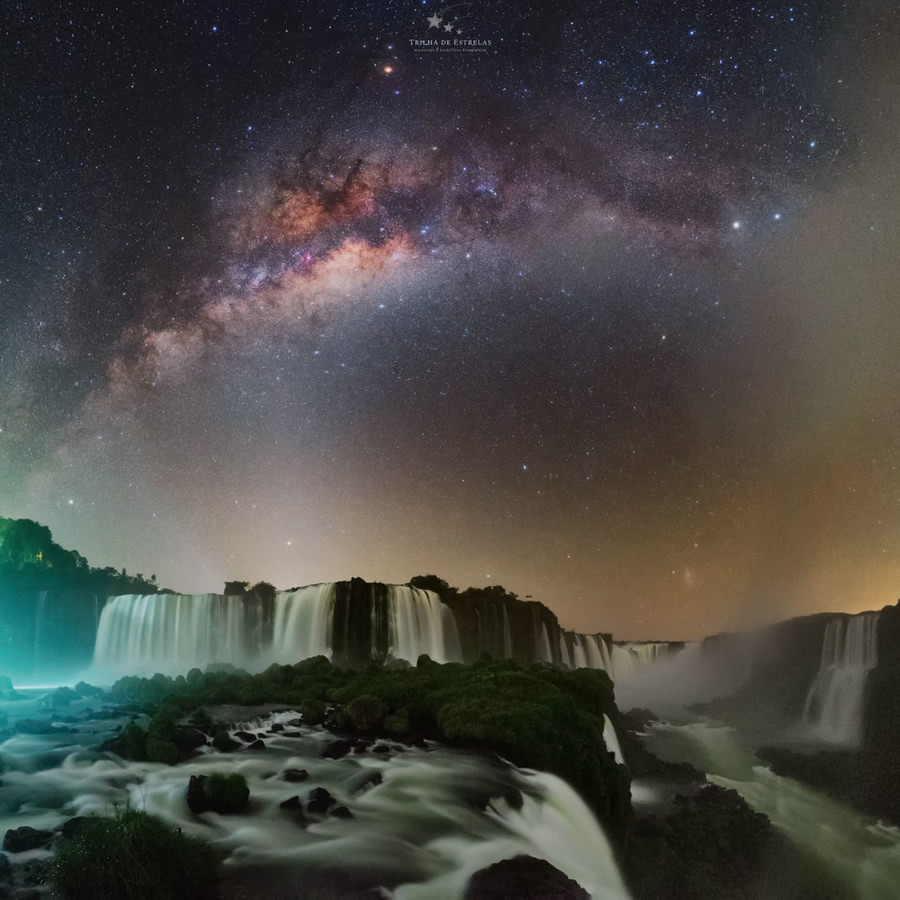
Iguazu Falls, Brazil
Photographing Iguazu Falls at night has always been one of my priority projects. In order to do so, I needed to obtain a special authorization from the environmental agency that is responsible for national parks in Brazil.
Finally, in early 2021, I got this authorization and set out to put my plan into practice. I spent 4 days inside the Iguazu National Park with exclusive access to the Falls at night for my students and me. The first challenge was to walk around the park at night knowing that several jaguars live there, which are frequently seen by employees and tourists.
In the area closest to the main waterfalls, the big challenge was to make long exposure images with the strong water spray from the more than 1.5 million liters per second that fall through the waterfalls. Working with exposure times longer than 10 or 15 seconds became an almost impossible task and the lens was never dry.
In this image, we have one of the main waterfalls of the Iguazu Falls complex, the “Santa Maria Jump.” Right over the fall, we can see Saturn and the zodiacal light illuminating the horizon. Further up there is the Milky Way Core. We can also identify some of the main emission nebulae present in this region of the sky.
#18 Steinsee by Benjamin Barakat
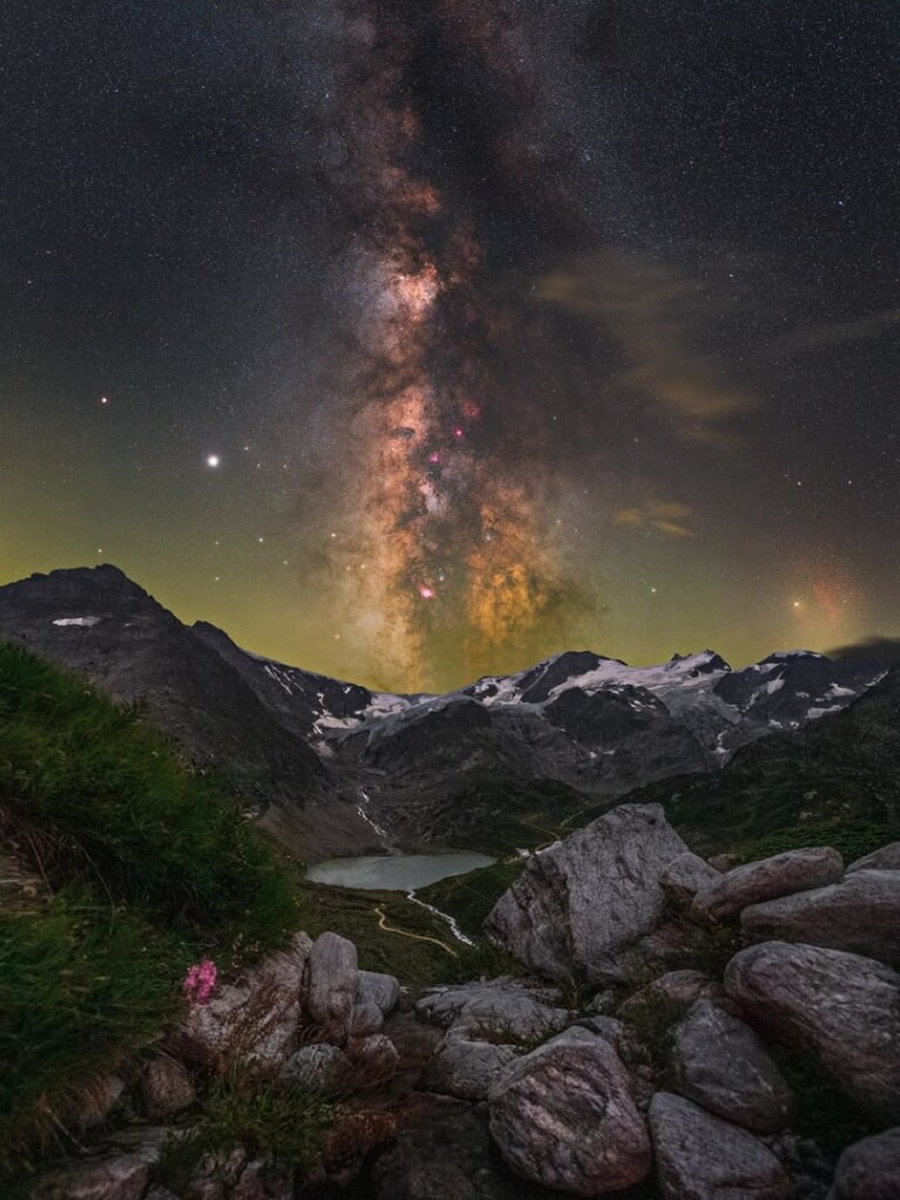
Susten Pass, Switzerland
This small Alpine lake is located in the Swiss Alps on a mountain pass. Most of the year, it’s closed due to snow but once it had cleared, I had to make my way there and capture the Milky Way.
Ideally, it would have been better to shoot this location earlier in the year, as the Milky Way set quickly behind the mountain at that time. The sky here was a Bortle class 3 and I was also able to capture the beautiful green airglow. It’s a stunning location for hiking and photography and I highly recommend passing by if you’re in the region!
#19 Navajo nights by Christine Kenyon
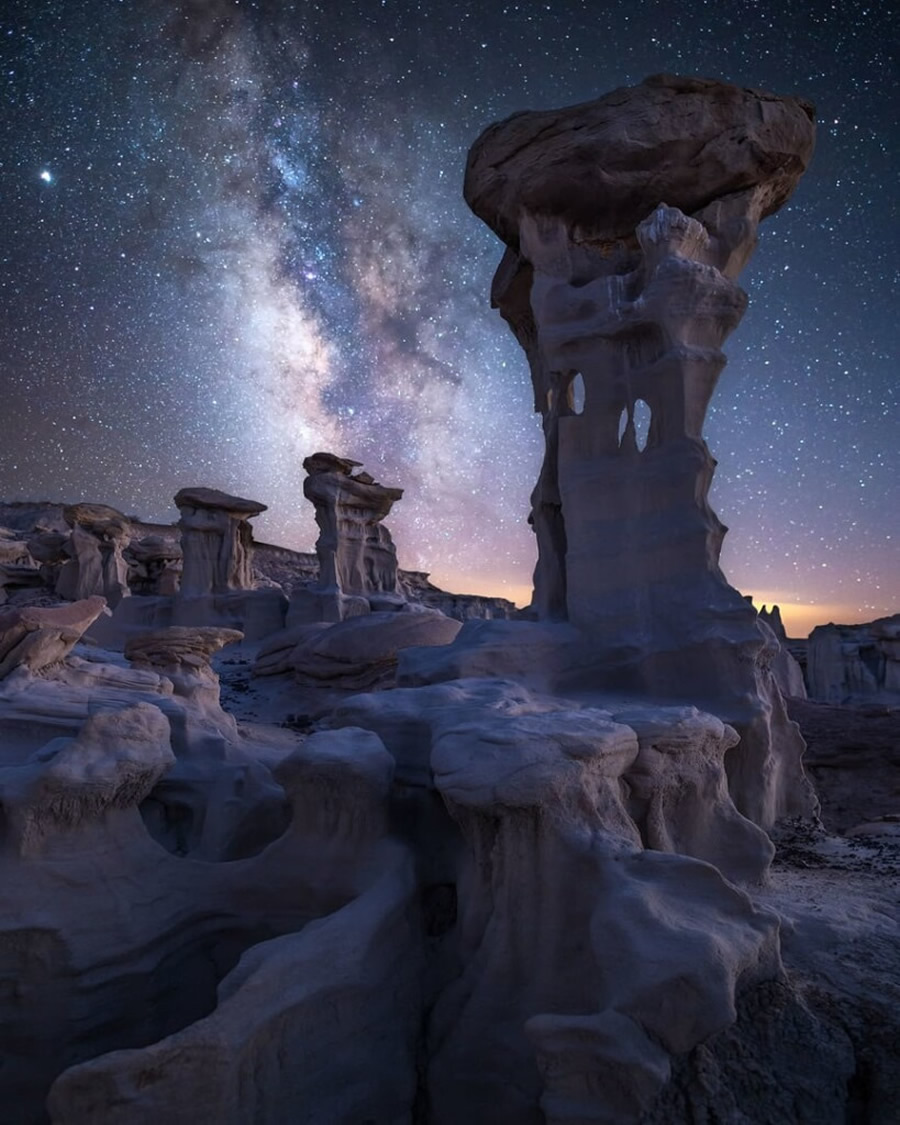
Bisti Badlands, New Mexico – USA
The mountainous West is awash in beauty, culture, history and tradition, and sites like this, in the Bisti Badlands, are treasures to behold and cherish. Arriving before sunset, I encountered several other photographers occupying the position best known as the classic shot of this place.
In no way ruffled, I scouted the area, as I normally do, looking intently for compelling compositions. When I saw this scene, and verified with the PhotoPills app that the Milky Way core would perfectly align with the rock feature, I was hooked.
With the silhouette of my Navajo guide nearby, I shot the foreground as blue hour washed over this ancient land, then watched with joy as the stars coursed through the heavens above. When the Milky Way rose into prominence and settled where I had hoped, I exposed for the sky to complete this blend.
Always remember that. while these are amazing natural wonders, these sites hold far greater significance for the Navajo people. Let us all protect and cherish these lands for generations to come. If I could leave you with just one piece of advice, it would be: always scout for your own compositions. Be a photographer, not a photocopier.
#20 Starry night at Helmos Observatory by Constantine Themelis
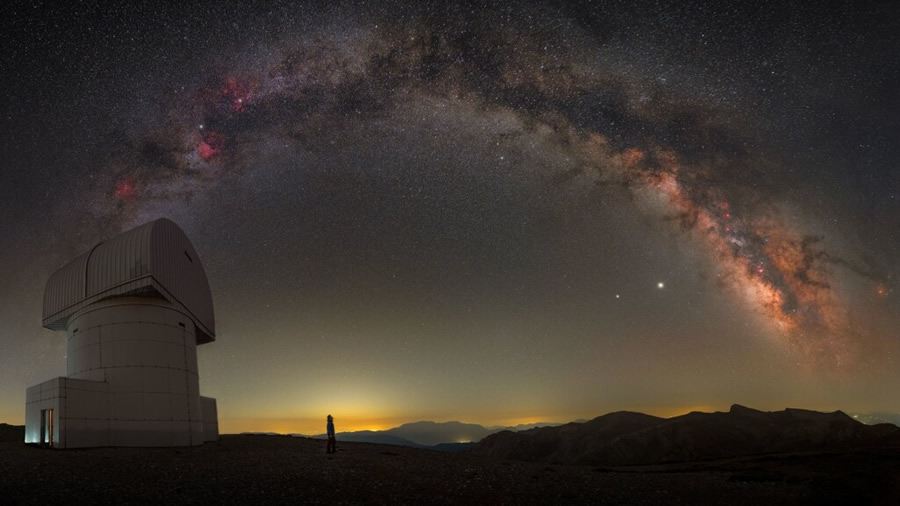
Helmos Observatory, Greece
Last year, I visited the Aristarchos 2.3m Telescope at the Helmos Observatory to capture the Perseids meteor shower. The observatory itself is located at an elevation of 2,340 meters above sea level and away from city lights, which gives you the opportunity to witness great-quality dark skies in Greece.
After setting two of my cameras for timelapse, I took the opportunity to capture the panorama I had in my mind…the galactic arch rising above the mountain range and the telescope itself. It was the first time that I used my astromodified EOS Ra and I was really hoping to capture the Ha emission nebulae in the Cygnus region. Everything went as planned, except that the telescope was scanning a supernova at the time and it was constantly moving. Luckily, I managed to stitch it manually in the post-processing. Every time I look at this image, it blows my mind to see what you can capture with recent technology and how close you can get to the cosmos.
#21 Nyctophilia by José Luis Cantabrana
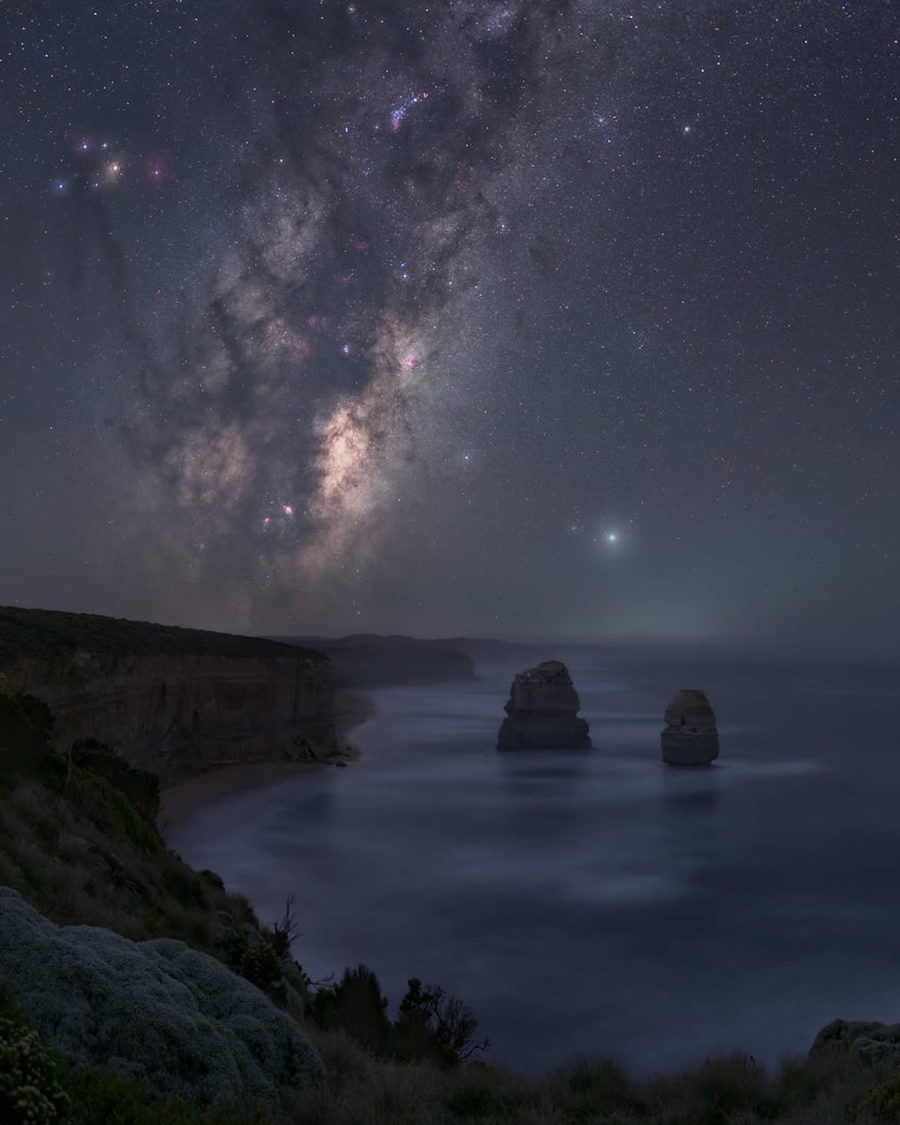
Great Ocean Road, Victoria – Australia
This incredible location has always amazed me, even before I had any interest in photography. This set of rocks, carved by the incessant churning of the sea and the powerful wind that whips the south coast of Victoria is, without a doubt, the most emblematic landscape of Australia.
After an amazing sunset followed by an ethereal moonset, I was standing there, contemplating the spot I had always dreamt of under a magical starry sky. However, not everything was pink that night… I had brought a new piece of equipment with me, a star tracker, and as soon I started to set it up, I knew it was going to be a tricky night. After numerous failed attempts to align it towards the south celestial pole, I was ready to give up, but I decided to take a shot and “see what happens” while the galactic core was rising up. Surprisingly, it worked out nicely, and a door opened for me, to a new magical world full of stars.
#22 Our Lady of the Snows by Uroš Fink
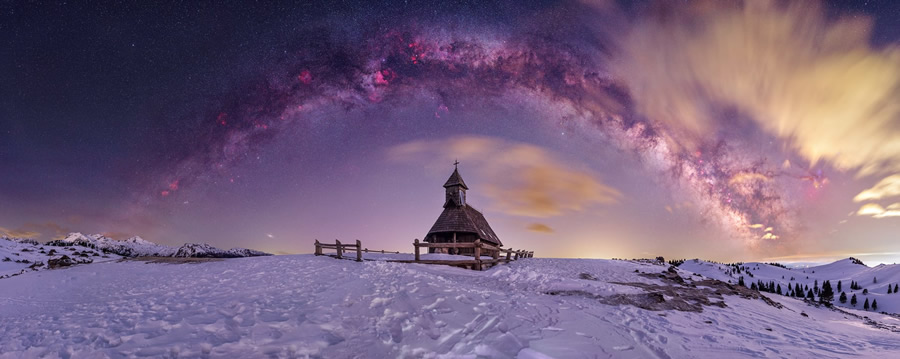
Velika Planina, Slovenia
I had been planning this panorama for quite some time, and as soon as I had the opportunity, I didn’t hesitate and went for it.
I hiked with my friend in the snow for around 3 hours, with 60kg (130 lbs.) of camera gear. Thankfully we had a sled, so we could pull the gear behind us. We spent the whole night outdoors under the starry sky at -10 degrees with a strong north wind, so I could barely feel my fingers on my hands. A great desire to photograph this beauty kept us upright all night, and in the end, we were rewarded with wonderful images. It was one of the most memorable nights I’ve spent capturing our galaxy.
“Velika Planina” is a big pasture karstified mountain plateau in the Kamniško- Savinjske Alps, in the northeast of Kamnik, Slovenia. It has an average elevation of 1,500 meters above sea level (Bortle sky 4). This area is also known for the wooden shepherds’ huts. In the center of the panorama, the protagonist is the chapel “Our Lady of the Snows.”
#23 ADK Magic by Daniel Stein
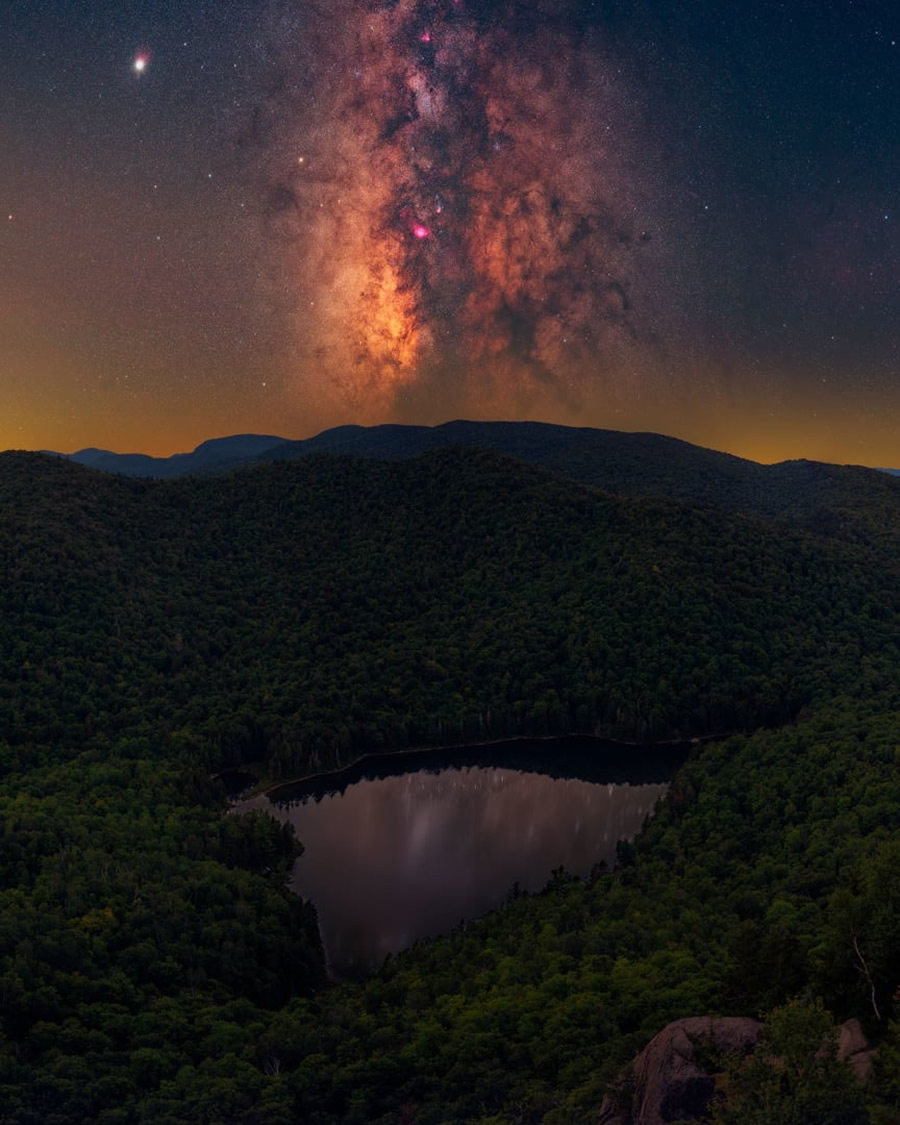
Adirondack Mountains, New York – USA
The East Coast is less commonly known for Milky Way photography due to its condensed population and, as a result, intense light pollution. However, there are still a few dark skies remaining…
Tucked away in upstate NY, the Adirondacks region consists of 6 million acres of land designated as “Forever Wild.” It is home to some of the last known darkest skies on the East Coast. I feel like I am home when I am hiking in the Adirondacks. This shot, then, captures the magic which I feel fills my heart when I am there. Not only does it consist of a lake which seems to take the formation of a heart itself, but it also shows just how much the East Coast has to offer: beautiful woodlands combined with still water and rolling hills. My heart is in these mountains, and I am so thankful to be able to explore them.
With that in mind, these mountains are constantly being swarmed with light pollution. The yellow glow on the horizon is light pollution from within the region as well as way off in the distance. My goal is to attempt to use my photography to raise awareness about the issue and restore the night. Remember: if you plan to visit the region, please read up on all current regulations, and leave no trace on site.
#24 The Forgotten side of Kanagaroo Island by Blntpencil
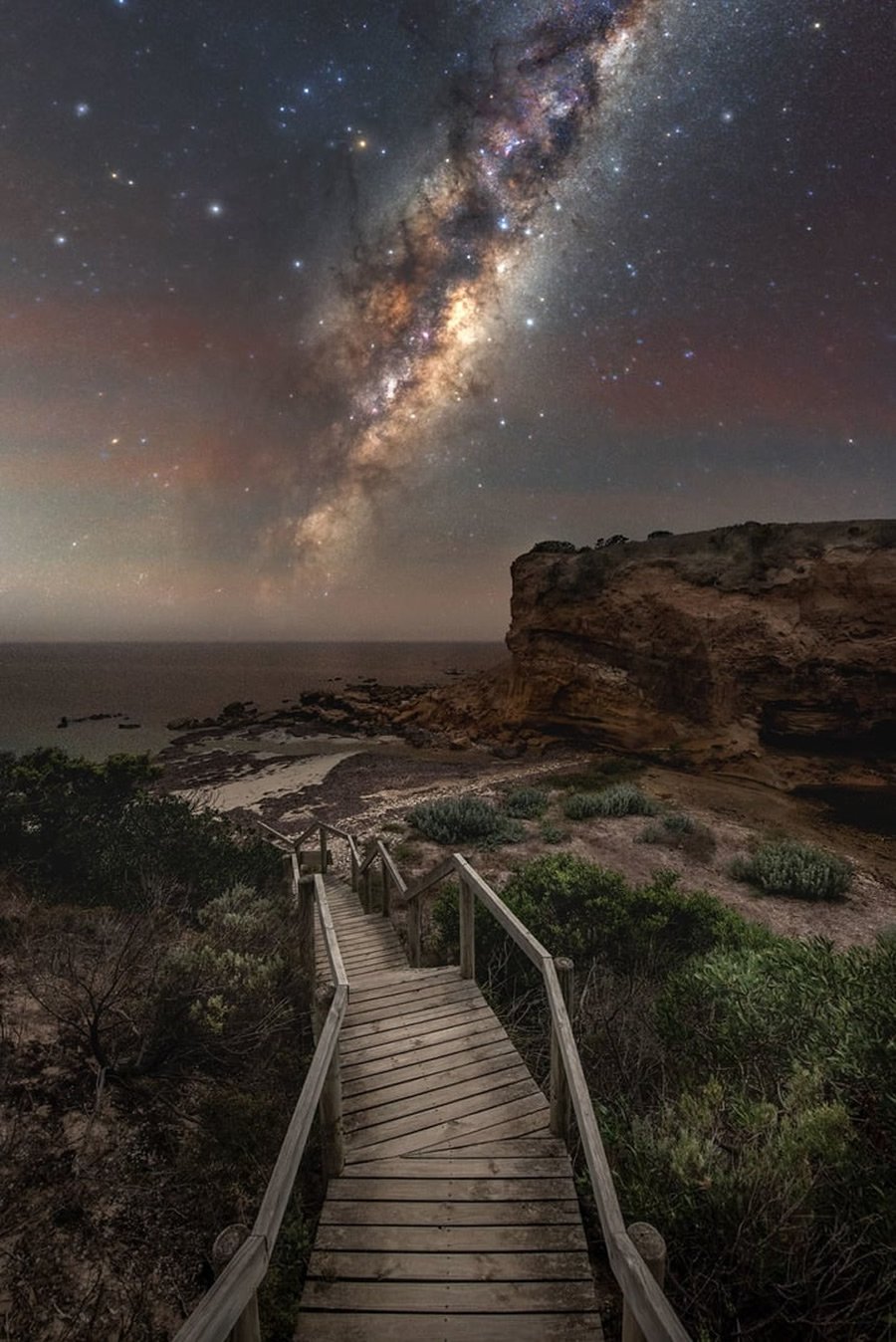
Baudin Beach, Kangaroo Island, Australia
This image was captured at Baudin Beach on Kangaroo Island. This part of the island was luckily not affected by the devastating bushfires in 2020. It is a capture of the rising Galactic Center floating above the ocean and represents the way of life on the island “where people live at one with nature.”
#25 Cadini di Misurina by Stefano Pellegrini
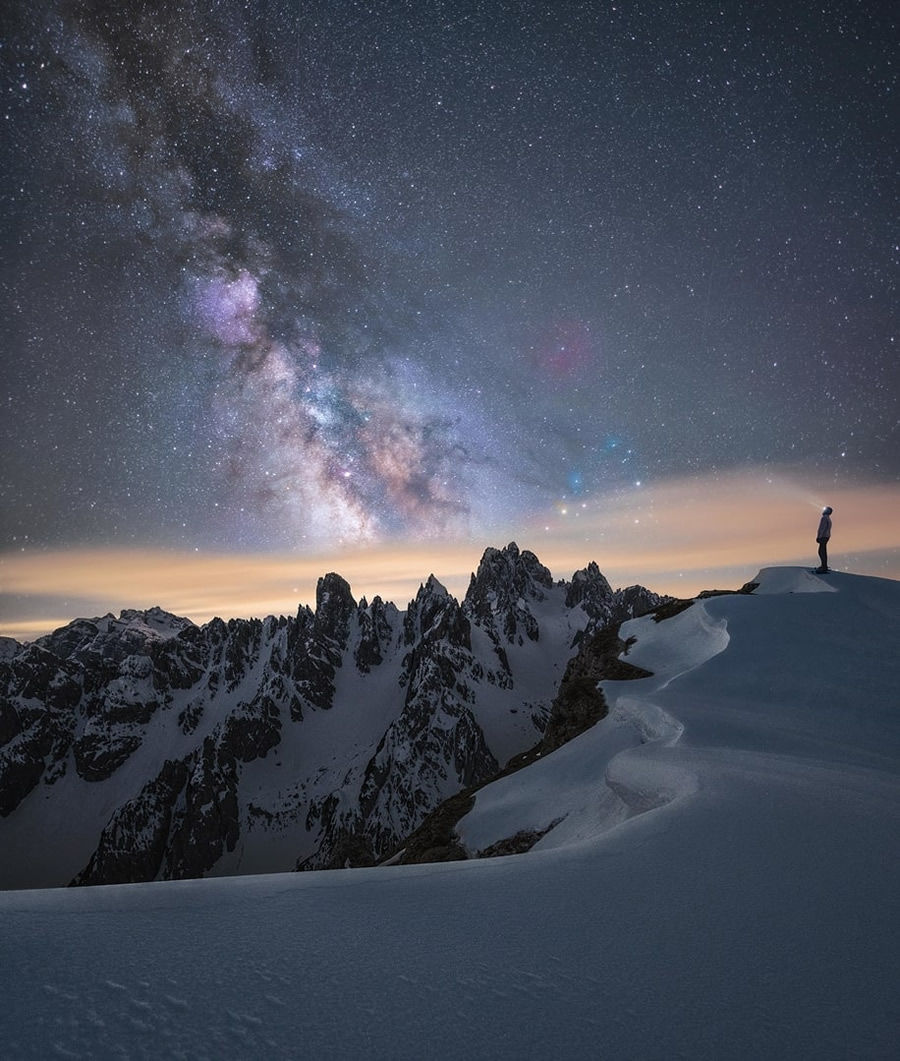
Cadini di Misurina, Dolomites – Italy
This was from a great Milky Way trip in the Italian Dolomites, although there were some challenges because of the weather. First of all, I took this picture in May when the snow had almost melted, so I had to make the ascent to “Auronzo” on foot instead of by snowmobile. Also, the path was hard because I had walk it in the middle of a heavy snow storm.
Fortunately, once I was at the top, the sky completely opened, a good sign for the night shooting. After a brief rest in the winter shelter, I started the hike to this spectacular location at midnight. Once I was at the spot, the compositional possibilities were very limited. This place, which is very popular during the summer, was completely different covered in snow. The whole ridge was covered in a 3-meter coat of puffy snow that made very dangerous to get too close to the edge. I placed the camera as close as possible to the rim to capture the mountain range, and then I moved all the way up to the right to complete the shoot with myself.

